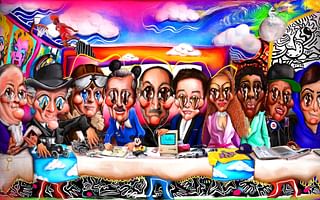Larry is a prominent art critic and historian who has devoted over 15 years of his life to the field. With a keen interest in contemporary art, he has spent his career studying and interpreting the works of Kaws. Larry earned his PhD in Art History from the University of Oxford and has an impressive portfolio of writings on the evolution of Kaws' style and his influence on the art world.
As an art critic and historian, I understand the allure and creativity behind fan art. It's a way for fans to express their admiration for an artist and their work. However, when it comes to selling fan art based on Kaws' work, the question of ethics arises.
Kaws, whose real name is Brian Donnelly, is a renowned contemporary artist known for his iconic figures and unique paintings. His work has gained significant recognition and value in the art world. As with any artist, Kaws holds the rights to his creations, which include the intellectual property rights.
When you create and sell fan art based on Kaws' work, you are essentially using his intellectual property to make a profit. This raises concerns about copyright infringement and the ethical implications surrounding it.
Legally speaking, selling fan art without the artist's permission is a violation of copyright law. Kaws, like any artist, has the right to control how his work is reproduced, distributed, and sold. This means that if you create and sell fan art without obtaining the necessary permissions or licenses, you may be infringing on his rights.
However, it's important to note that the ethical considerations surrounding fan art are not always black and white. Some argue that fan art is a form of homage and a way for artists to pay tribute to their favorite creators. It can also help to promote an artist's work and expand their fan base.
To navigate the ethical landscape of selling fan art based on Kaws' work, it's crucial to consider a few key factors:
1. Respect for the artist: Artists invest their time, energy, and creativity into their work. Respecting their rights and acknowledging their contribution is essential. If you choose to create and sell fan art, it's important to do so in a way that doesn't undermine or exploit the artist's efforts.
2. Obtaining permissions: If you wish to sell fan art based on Kaws' work, it's best to seek permission from the artist or their representatives. This can involve reaching out to Kaws' studio or legal team to discuss licensing agreements or collaborations. Obtaining proper permissions ensures that you are respecting the artist's rights and avoiding any legal issues.
3. Transformative creativity: One way to approach fan art ethically is by adding your unique creative twist to the original artwork. Transforming the original work into something new and distinct can help distinguish your fan art from mere reproductions. This transformative element can make your art more original and less likely to infringe on the artist's rights.
4. Personal use vs. commercial use: Selling fan art for personal use, such as displaying it in your home or giving it as a gift, may be seen as less ethically problematic than mass-producing and profiting from it. Consider the scale and intent of your fan art sales to ensure you are acting ethically.
In conclusion, the ethics of selling fan art based on Kaws' work are complex. While it may be tempting to create and sell fan art, it's crucial to respect the artist's rights and consider the legal and ethical implications. Seeking permissions, adding transformative creativity, and distinguishing between personal and commercial use can help navigate this ethical landscape. Remember, appreciating and supporting artists like Kaws can be done in many other ways, such as attending exhibitions, purchasing authorized merchandise, or sharing their work with others.















